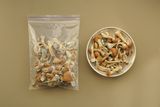Now Reading: Magic Mushroom Edibles Found Containing Synthetic Psychedelics, Not Psilocybin
-
01
Magic Mushroom Edibles Found Containing Synthetic Psychedelics, Not Psilocybin
Magic Mushroom Edibles Found Containing Synthetic Psychedelics, Not Psilocybin

Rapid Summary
- Magic Mushroom Edibles Examination: Researchers at Oregon State University found that several “magic mushroom” edibles sold in Portland did not contain psilocybin or its metabolite,psilocin.
- Contents of Edibles: Instead of the expected ingredients, these products included undisclosed compounds like synthetic psychedelics (syndelics), kava extracts, botanical hemp, and caffeine.
- Public Health Concerns: The rise of syndelics could pose risks due to uncertain pharmacology and toxicity.Clarity in labeling is imperative as more cases linked to adverse reactions emerge.
- Regulatory Measures Needed: Collaboration between academia, public health agencies, and industry is essential to ensure consumer safety. Enhanced detection methods for adulterants are recommended.
- CDC Report on Emergency Cases: In 2024, 180 emergency cases were connected with magic mushroom products.
Indian Opinion Analysis
India’s cautious approach toward psychedelic substances contrasts sharply with developments in Oregon and Colorado. The vulnerabilities exposed by the investigation into mislabeled magic mushroom edibles underline the importance of precise regulations and robust enforcement mechanisms.For a country like India-where mental health treatments are rapidly evolving yet remain largely conservative-this issue sheds light on challenges tied to emerging therapeutic domains.
If India were ever to consider similar therapeutic uses for psychedelic compounds under controlled conditions, it would need a framework that prioritizes stringent oversight akin to pharmaceutical standards rather than retail-level availability. This incident highlights how gaps in regulation can compromise consumer safety while dampening trust in potential scientific advancements.























